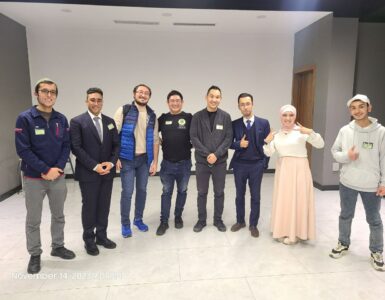While most investors have been shying away from Ukraine’s volatile market in the wake of Russia’s 2022 invasion, Justin Zeefe, an American venture capitalist with a background in government intelligence, is doubling down on the country’s defense technology sector.
In an interview with Icebreaker, Los Angeles-based Zeefe compared the opportunity to investing in Israel’s tech ecosystem during its formative years over two decades ago.
“I will argue that the opportunity to invest in Ukraine’s tech ecosystem now is analogous to investing in Israel’s tech ecosystem in the early 1990s,” he says.
Zeefe’s career journey is as unconventional as his thesis. A decade-long veteran of the U.S. government, Zeefe later co-founded Nisos, an intelligence company serving Fortune 1000 clients. This background gives him a unique perspective on the intersection of technology, defense and geopolitics.
Currently, Green Flag Ventures, which Zeefe co-founded in March 2023, is raising a $20 million fund focused on early-stage Ukrainian startups in artificial intelligence, cybersecurity, and dual-use technologies.
The firm has already made several investments, including in Swarmer, a company developing AI-driven autonomous multi-drone systems. Last month, Green Flag Ventures participated in the startup’s $2.7 million seed funding round. This investment aims to accelerate the development and adoption of Swarmer’s multi-domain autonomy technology for battlefield operations.

“Their product has already run thousands of missions on the front,” Zeefe notes, highlighting the real-world validation these startups are receiving. “It’s a trusted capability that they’ve only refined based on battlefield feedback.”
Greenflag Ventures’ portfolio companies also include Kara Dag, Himera, Swarmer, and AstraNav, according to the company website. Kara Dag produces UAS detection and jamming systems, while Himera develops communication devices designed to resist electronic warfare. And AstraNav has created a magnetic field-based geolocation technology.
But investing in a country at war comes with obvious risks. Zeefe is quick to address these concerns, pointing out the mitigating factors that make Ukrainian tech companies more resilient than one might expect.
“Most of these companies have corporate status or are domiciled outside of Ukraine,” he explains. “It’s a Delaware company or an Estonian company for the purposes of protecting their IP.” He also notes that many have established production facilities outside Ukraine to limit physical threats.
Green Flag Ventures brings unique on-the-ground expertise to its investments, with co-founder Deborah Fairlamb based in Kyiv and venture partner Mike Baird, a former U.S. Air Force attaché to Ukraine, also operating from the country.
“Mike speaks Ukrainian and Russian and is able to go to the front and observe them in real time in a battle environment, engaging in natural language with the founders or with the soldiers who are using that capability,” Zeefe notes.
His confidence is bolstered by Ukraine’s deep pool of technical talent, estimating Ukraine will surpass Israel in terms of highly trained, qualified technical talent in three years.
In fact Ukraine has established a reputation as a popular tech outsourcing hub, with around 300,000 new highly trained tech professionals, which could very well put it on track to surpass Israel’s tech workforce in the near future.
The ongoing conflict and urgent demand have been accelerating innovation in certain sectors, through rapid development and iteration.
“Ukraine right now needs as many drones in the air as it can get for as inexpensive as they can be made to accomplish the mission that they’re designed to suit,” Zeefe says.
However, Zeefe is careful to distinguish between short-term wartime needs and long-term market potential. “That does not mean that there’s an overseas addressable market for just as many drones companies or as many drones as you can make,” he cautions.
Green Flag’s investment strategy reflects this nuanced view. Rather than betting on hardware manufacturers, they’re looking at companies building novel technologies that can be integrated into various platforms.
Despite the inherent risks, Zeefe is finding no shortage of interest from co-investors. “Deal flow is not a problem,” he says, noting that the firm often shares promising deals with other VCs when they can’t take the entire allocation.
For Zeefe, the opportunity in Ukraine goes beyond financial returns. He sees it as a chance to support a country fighting for its sovereignty while potentially uncovering the next big tech success story.
As Ukraine continues its fight, some are betting that from the crucible of war, a new tech powerhouse will emerge. In the process, it’s become the epitome of the high-risk, high-reward proposition – the kind that investors like Zeefe find too compelling to ignore.






Add comment